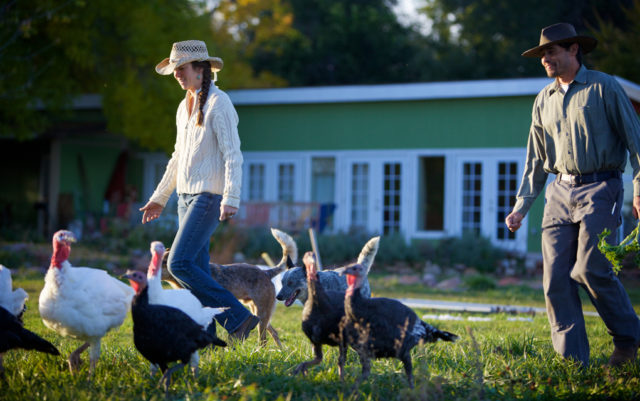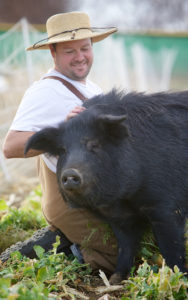
“Is the sky really falling this time? It has fallen before — after the Holocaust and Hiroshima, the assassination of JFK, RFK and MLK, the war in Vietnam, Kent State, Watergate, Black Monday, Enron, 9/11, Shock and Awe, Bernie Madoff, the Great Recession. Now in the second decade of the 21st century, climate change, terrorism, widening wealth inequality and fake news are clamping down on our consciousness. We need to discover new ways to bend entropy, befuddlement, and violence toward beauty, health and peace.”
So writes Woody Tasch, founder and chairman of Slow Money, a nonprofit formed in 2008 to catalyze the flow of investment capital to small food systems through low-interest loans (i.e., investments). He’s likely written these words in his forthcoming book, SOIL, from his home on two acres in the foothills of Boulder. From his window he can see a meadow, several rock outcroppings and swaths of pine trees, his bucolic slice of life standing in stark contrast to the maelstrom he describes.
But it’s precisely this space between big system problems and the earth beneath our feet that Tasch insists on inhabiting, not yet convinced that there is nothing we can do about the litany of problems we face.
SOIL, Tasch says, is a humble attempt to put Wendell Berry’s poetic spirit into an economic framework.
“If we really are to address some of these deep structural problems in the economy, it has to take us all the way back to how we grow our food, all of which depends on soil,” Tasch says.
On Oct. 16 and 17 hundreds of people — investors, farmers, scientists and concerned citizens — will gather in Boulder to launch a philanthropic venture, Slow Opportunities for Investing Locally (SOIL), which coincides with the release of Tasch’s book.
SOIL’s model is a simple tweak on the low-interest one Slow Money already uses, which Tasch describes as a boundary activity between investing and philanthropy — consider it either a traditional investment with a unique social return, or a kind of philanthropy with an uncommonly high financial return.
“We want to be in that boundary zone in order to break out of our old, broken ways of thinking and start prioritizing the local food system, soil fertility, all the things we want to support until numbers get in the way because they just aren’t capable of garnering the same degree of return on investment.”

With SOIL, Tasch seeks to attract a greater number of investors; individuals can become a member with a tax deductible donation of $100 or more. Then, members meet to make 0 percent loans to local farmers and food entrepreneurs, by majority vote — one member, one vote, no matter what the size of the donation. When loans are repaid, funds are recycled into new loans.
“We are trying to redefine what it means to have a successful enterprise,” says Michael Bartner, vice president of the Slow Money Institute. “Instead of asking about rates of return like you would with angel investing or low-interest loans, this philanthropic model will allow us to start asking questions about the values of the enterprises we invest in, how it will contribute to carbon restoration in the soil, and how it might bolster a local food economy.”
Slow Money launched a similar model two years ago in the Roaring Fork Valley where 33 individuals have contributed a total of $206,000 in amounts ranging from $100 to $80,000. Seven loans have been made to date, with more in the pipeline, funding projects like buying a refrigerated truck for an organic flower farm or building a hoop house to extend the growing season for a small-scale vegetable grower.
Now the model is moving to Boulder as a pilot program of sorts. Here on the Front Range, SOIL is starting off with $75,000 from a dozen founding members and advisors, including Brian Coppom, executive director of the Boulder County Farmer’s Market. Given the population and geographical factors on the Front Range, Tasch believes SOIL will be able to achieve more scale than its sister group in the mountains with the potential to grow into a significant resource for funding local food systems.
You’d think Boulder County would be the perfect place to try out a new philanthropic investment model in local food, supported as it is by venture capital, tech start-ups and natural food companies. You’d think that the county’s penchant for farmers markets and farm-to-table dinners would translate to an inclination to invest in these food economies. And yes, local food is becoming a powerful economic development strategy for towns like Boulder, but, as Michael Bartner puts it, “the arithmetic is tricky; the bottom line may simply be too low for some businesses and investors to get traditional investments. That’s why we need something totally new.”
The problem is that we may not have the luxury of time, says geomorphologist and MacArthur Fellow David Montgomery, keynote speaker at the upcoming SOIL gathering. For the last 10 years, Montgomery has been studying the relationship between the health of soils and civilizations. In his first book on the topic, Dirt: the Erosion of Civilizations, he came to the rather unsavory conclusion that, based on our soil health, our society is on the brink of demise.
“You look at how we have treated soil through history and if we do it again we are doomed,” he says. “But over the last 10 years I have become an optimist, I actually think we can solve the problem and in relatively quick order. It all revolves around changing our farming practices.
“I’ve interviewed farmers all around the world who were forced to withdraw from high-input farming practices (using fertilizers, patented seeds, fossil fuels, etc.) because they could no longer afford to participate. So these guys went no-till, they started diversifying their rotations and using cover crops in the off-season because they had to.”
Not only did these changes lower the cost of farming and raise the price farmers could charge for their produce, it also restored the fertility of the soil.
“I am not in the investment world or the farming world, but to me it seems that if you can invest in a farm to make it profitable in the short-term through practices that restore soil fertility, you increase the value of the farm in the long run.”
Montgomery doesn’t see large-scale investment in soil fertility being driven by investors, but by the farmers themselves who have a relationship with the land and care about the health of the land their children will inherit.
“Soil health degrades bit-by-bit, slowly enough to be ignored in a single lifetime, but fast enough over centuries to limit the lifespan of civilizations. Farmers are in a unique position to hold both perspectives… and to do something about it.”














